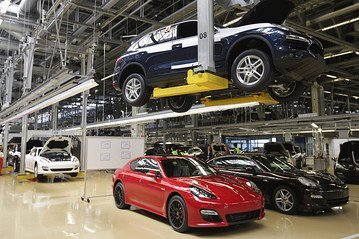Is Porsche Still a Sports Car Company?

The brand has unnerved purists in recent years, first with the launch of its hulking Cayenne sport-utility vehicle, then a four-door sedan called the Panamera. Though the expansion has boosted the Volkswagen AG-owned car maker’s sales by nearly 50% over the past four years, the Cayenne and Panamera made up roughly three-quarters of its 143,000 vehicle sales last year.
Next year, Porsche takes yet another big step from its sports-car roots with a new compact SUV. Chief Executive Matthias Müller says it could add up to 75,000 to its annual sales—further eclipsing Porsche’s legendary 911, Boxster roadster and its hard-topped sibling, the Cayman. The company also is weighing developing a smaller version of the Panamera.
“If the sports cars get drowned out, they risk killing the golden goose,” says Mark Ritson, an associate professor of marketing at the University of Melbourne’s business school who has consulted for luxury brands. A happy Cayenne owner, Mr. Ritson counts himself as one of the thousands of decidedly nonsports-car drivers Porsche has lured with its model expansion. But the powerful SUV “is so far from a [911] Carrera, it is unbelievable,” he adds. “It is a big, fat people-mover.”
Porsche is turning to measures unusual for a car maker known for its minimalist marketing efforts to keep that adrenaline-pumping connection alive. It is returning to the 24 hours of Le Mans race next year and building “experience” centers in Shanghai, Atlanta and Los Angeles aimed at cultivating sports-car aficionados with on- and off-road test tracks and driving courses. It also has stepped up Porsche roadshow events.
“I’m convinced we have to do something to keep our brand image high, and these kinds of measures are helping do that,” said Mr. Müller in a recent interview at the company’s Stuttgart headquarters.
A longtime veteran of German luxury-car maker Audi and its parent Volkswagen, which completed a protracted takeover of Porsche last year, Mr. Muller has implemented many of the moves since becoming CEO in late 2010.
Porsche’s efforts underscore the tricky balancing act niche car makers face in leveraging their brands to fuel growth and finance ever-costlier technologies without diluting them in the process. Even as it pushes toward a target of 200,000 cars in annual sales by 2018, every Porsche that rolls off the company’s German assembly lines is custom-built to each buyer’s wishes, down to the stitching of its leather interior.
Related News


